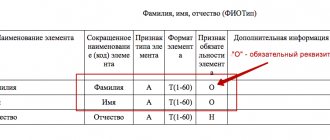Methods for checking counterparties
Thus, in letter dated June 24, 2016 No. ED-19-15/104, the Federal Tax Service of Russia again reminded of the methods for verifying the integrity of counterparties. Tax authorities advise taxpayers to follow:
- clause 12 of the Criteria, approved by order of the Federal Tax Service of Russia dated May 30, 2007 No. MM-3-06/ [email protected] ;
- information that is posted on the official website of the Federal Tax Service of Russia in the section “Publicly available criteria for self-assessment of risks” (“Business risks: check yourself and your counterparty”);
- information about the addresses of “mass” registration and the names of legal entities whose executive bodies include disqualified persons.
This information is also posted on the website of the Federal Tax Service of Russia.
Checking registration in the Unified State Register of Legal Entities
To check, you can use electronic services on the website of the Federal Tax Service of Russia:
- “Information on state registration of legal entities.” It is enough to enter the OGRN, INN or name of the counterparty to find out whether it is registered in the Unified State Register of Legal Entities. If the counterparty exists, then information about its OGRN, TIN, legal address, full name will be provided. manager and founders, types of activities according to OKVED;
- “Information published in the journal “Bulletin of State Registration” on decisions made by registration authorities on the upcoming exclusion of inactive legal entities from the Unified State Register of Legal Entities. The tax authority may make such a decision if the counterparty has not submitted tax reports within 12 months and has not carried out transactions on at least one bank account. An inactive organization cannot enter into and execute contracts (clauses 1, 2, Article 64.2, Article 419 of the Civil Code of the Russian Federation).
An alternative option is to obtain an extract from the Unified State Register of Legal Entities in relation to the counterparty in paper or electronic form (clause 2 of Article 6 of the Federal Law of 08.08.2001 No. 129-FZ “On State Registration of Legal Entities and Individual Entrepreneurs”, hereinafter referred to as Law No. 129- Federal Law).
Checking other information
To obtain other information about the counterparty, the following services are available on the website of the Federal Tax Service of Russia:
- “Information about persons in respect of whom the fact of impossibility of participation (execution of management) in the organization has been established (confirmed) in court”;
- “Information about legal entities that have tax arrears and/or have not submitted tax reports for more than a year.”
In addition, you must request from the counterparty the following documents or their certified copies:
- articles of association;
- certificate of state registration of the organization;
- certificate of registration of the organization with the tax authority;
- decision on the election (appointment) of the head of the organization;
- the second and third pages of the passport of the head of the organization.
The validity of a passport can be checked by its series and number using the “Checking against the list of invalid Russian passports” service on the website of the Federal Migration Service of Russia.
It is also recommended to try to analyze the financial statements of the counterparty for the year preceding the year of the transaction. Data from an organization's financial statements for any period can also be obtained free of charge from Rosstat (provided that the organization submitted its financial statements to the statistical authorities). To do this, you need to send a request to any territorial statistical office in an approved form.
How to prove the fact of verification
To prove that the verification of the counterparty’s integrity was actually carried out, you should:
- make copies of Internet pages (screenshots) with information about the counterparty from electronic services on the website of the Federal Tax Service of Russia;
- issue a certificate with attached received or printed documents (screenshots).
Information about the counterparty stored in the program
If the organization or individual entrepreneur for which the dossier has been generated is contained in the directory of counterparties, then in the Program Data
information on this counterparty entered into the information base is displayed (Fig. 3):
- Name;
- basic details;
- legal, postal and actual addresses;
- contact faces;
- bank accounts;
- contracts, etc.
When creating a dossier, information about the counterparty contained in the program is automatically verified with the data of the Unified State Register of Legal Entities. In case of discrepancies, the program will report them. This will allow the user to adjust information about the counterparty in the accounting system. If the counterparty is not in the information base, then in the Program Data
Add to directory
button will be displayed in the command panel .
Rice. 3. Information about the counterparty according to the program data
Will the services of the Federal Tax Service save you from accusations?
Is the use of “verification” electronic resources of tax officials always a panacea for accusations and is it worth relying only on them?
So, on the official website of the Federal Tax Service of Russia there is an online service “Business risks: check yourself and your counterparty.” It includes several blocks of information that can be used to obtain reliable information about the fact of registration of a legal entity.
note
During legal proceedings, sometimes incidents occur. Thus, the AC of the Central District, in its resolution dated 08/05/2016 F10-2578/2016, was forced to indicate to the tax authorities that the absence of the company’s counterparties at the place of registration three years after the transaction is not a manifestation of negligence and a reason for additional assessments.
Any company can use these resources. However, it is worth remembering that the use of these resources to confirm the integrity of the counterparty is not directly established in tax legislation.
Some courts accept the fact of verification of the counterparty through the tax authorities’ website and do not require the provision of other evidence of good faith. Thus, the resolution of the Federal Antimonopoly Service of the Moscow District dated July 11, 2011 No. KA-A41/6979-11) contains the conclusion that a company that has monitored the integrity of counterparties through official information sources does not have the obligation to check their tax and accounting statements, or accept other measures to identify reliability as taxpayers.
The counterparties are registered in the Unified State Register of Legal Entities with the same legal addresses and INNs, which are confirmed on the official website of the Federal Tax Service of Russia. The company took all measures within its power and exercised due diligence. Therefore, it cannot be deprived on formal grounds of the right to reduce the income tax base for expenses and to deduct VAT.
In the resolution of the same FAS Moscow District dated February 15, 2012 No. A40-128151/2010, the judges recognized that the company showed due diligence and caution with the help of:
- requesting constituent documents, licenses to carry out work, documents on registration with the tax inspectorate;
- evidence of business correspondence, including on the appointment of responsible persons;
- checking the legal capacity of counterparties by turning to open sources of information (media, Internet);
- receiving extracts from the Unified State Register of Legal Entities from the inspectorate.
However, in other situations, judges may decide that data from Internet services is not evidence of the sufficiency of verification of the counterparty. Thus, in the resolution of the Federal Antimonopoly Service of the Moscow District dated December 13, 2011 No. A40-21233/2011, the servants of Themis sided with the Federal Tax Service. The decision stated that the company did not provide evidence of requesting documents from counterparties during the disputed period, and information about disputed counterparties available in the Unified State Register of Legal Entities and on Internet services does not indicate due diligence in selecting counterparties and does not allow one to draw a conclusion about the reality of conducting their financial and economic activities.
Thus, judicial practice is quite contradictory. Of course, companies can use the electronic services of the Federal Tax Service of Russia to check counterparties, but only as auxiliary tools. Will anything change in the near future? They promise yes...
Analysis of financial statements
In the Reporting Analysis
summary indicators are derived from the counterparty’s financial statements (sales revenue, profit, cash, fixed assets, inventories, net assets, etc.). Indicators for analysis are displayed for three years (Fig. 5). The information presented about the financial condition of the counterparty is understandable even to those users who do not maintain or know accounting. For the accounting (financial) statements of SO NPOs, summary indicators are not provided.
Rice. 5. Analysis of the counterparty’s financial statements
Disclosure of tax secrets
From June 1 in Russia, all information about companies that do not constitute tax secrets has become publicly available. Such changes were introduced by Federal Law No. 134-FZ dated May 1, 2016. In this regard, the Federal Tax Service of Russia released Information stating that the publication of open information about companies will take place throughout the year - until July 1, 2021.
We are talking about posting information such as: the average number of employees of the organization for the calendar year, about the company’s income and expenses, about taxes and fees paid, about the amounts of arrears and debts on penalties and fines.
The data will be posted in free public access on the official website of the Federal Tax Service of Russia.
According to the developers of the document, the law was supposed to give businesses a tool for checking future business partners. At the same time, the authors of the amendments believed that the very fact of publishing data should motivate businessmen to take care of the company’s reputation. But, according to experts, the situation with removing tax secrecy is similar to using a medicine with a lot of side effects.
note
An extract from the Unified State Register of Legal Entities cannot be considered by the court as the only evidence that the company was careful when choosing a partner (resolution of the Fourteenth Arbitration Court dated October 27, 2014 in case No. A05-3286/14).
In the interaction between the taxpayer and inspectorates, the innovation to abolish secrecy will have its consequences. For example, it will be easier for fiscal officials to file claims against a company regarding lack of diligence when choosing a counterparty.
However, some open indicators - such as the number of employees - may be biased criteria in determining whether a company is reliable and can be dealt with.
In practice, it happens that even if an organization has few employees, this does not prevent it from finding good, intelligent subcontractors and completing everything efficiently and on time. Civil legislation does not prohibit this form of solving business problems.
Another weak point of the new law is the desire of the authorities to make open data on the company’s arrears. In practice, it may happen that an organization disputes and “fights off” additional assessments from the inspectorate, but disputes with the tax office are not a quick process. Resolving the conflict may take a year or more, and the arrears will be reflected in public data about the company, and this fact may influence the final decision of the company's clients.
Due diligence: TOP 7
The necessary measures indicating the exercise of due diligence have been developed on the basis of arbitration practice. However, their list is not exhaustive. Let's give the main ones.
- At the time of concluding a transaction, the company is obliged to check with its counterparty the presence of state registration in the Unified State Register of Legal Entities (USRIP).
- To fulfill obligations under the contract, the counterparty in some cases must have an appropriate license. A copy of the license must be requested from the counterparty company. When receiving this document, you should pay attention to its validity period. Information about licenses issued to a counterparty can also be checked on the websites of licensing authorities.
- One of the signs that an organization is exercising due diligence is to request from the counterparty the constituent documents (charter, a copy of the charter), as well as a copy of the certificate of registration with the tax office.
- When drawing up an agreement, you should verify the identity of the person acting on behalf of the counterparty, as well as whether he has the appropriate authority.
- When concluding a transaction, make sure that the counterparty has a valid current account.
- It is necessary to make sure that the counterparty is engaged in real business activities. It is important to make sure that he has all the capabilities, including material and personnel, to fulfill the obligations that he wants to undertake under the contract. Therefore, it is advisable to request from the counterparty information about material and technical resources, the availability of qualified specialists and the annual volumes of implementation of similar contracts. Take the time to find out how the counterparty performed when working with other companies.
- Don't throw away your business partners. A long-term relationship with a supplier, against which the inspectors had previously had no complaints, also indicates that the taxpayer exercised due diligence.
Editorial Board "PB"
Sergey Danilov
How to use the service
" " - paid service. You can see the tariffs on the website in the “Prices” section. But you can use it for free right now and enjoy all the benefits of the program.
Get trial access and have time to test your partners. It only lasts for a day. Make the most of this time. You can:
— compile a dossier for each counterparty; — check whether your partners are associated with fly-by-night and dubious companies; — find out whether partners have false information in the Unified State Register of Legal Entities; — view the latest changes in the Unified State Register of Legal Entities; — check the director for mass participation.
Go to the website and check the reliability of your counterparties.
In the program “1C: Trade Management, ed. 10.3" has a very convenient and useful report on contact information. The report is used to obtain a list of contact information, and it has quite a lot of settings.
Menu: Reports - Customer Relationship Management - Contact Information Report
The report can be generated using contact information from various directories:
- Counterparties
- Contact faces
- Users
- Organizations, etc.
For example, you can generate a report on the contact information of counterparties.
After selecting a directory, you can check the required types of contact information:
If you select the “From directory” option in the “Filling” field, the program will show all possible types of contact information.
The “From register” filling option implies displaying in the report only those types of contact information that are filled in at least one element of the directory.
On the “Grouping”, “Selection” and “Sorting” tabs you can make other report settings. You can read more about setting up reports in the article “article about setting up reports”.








